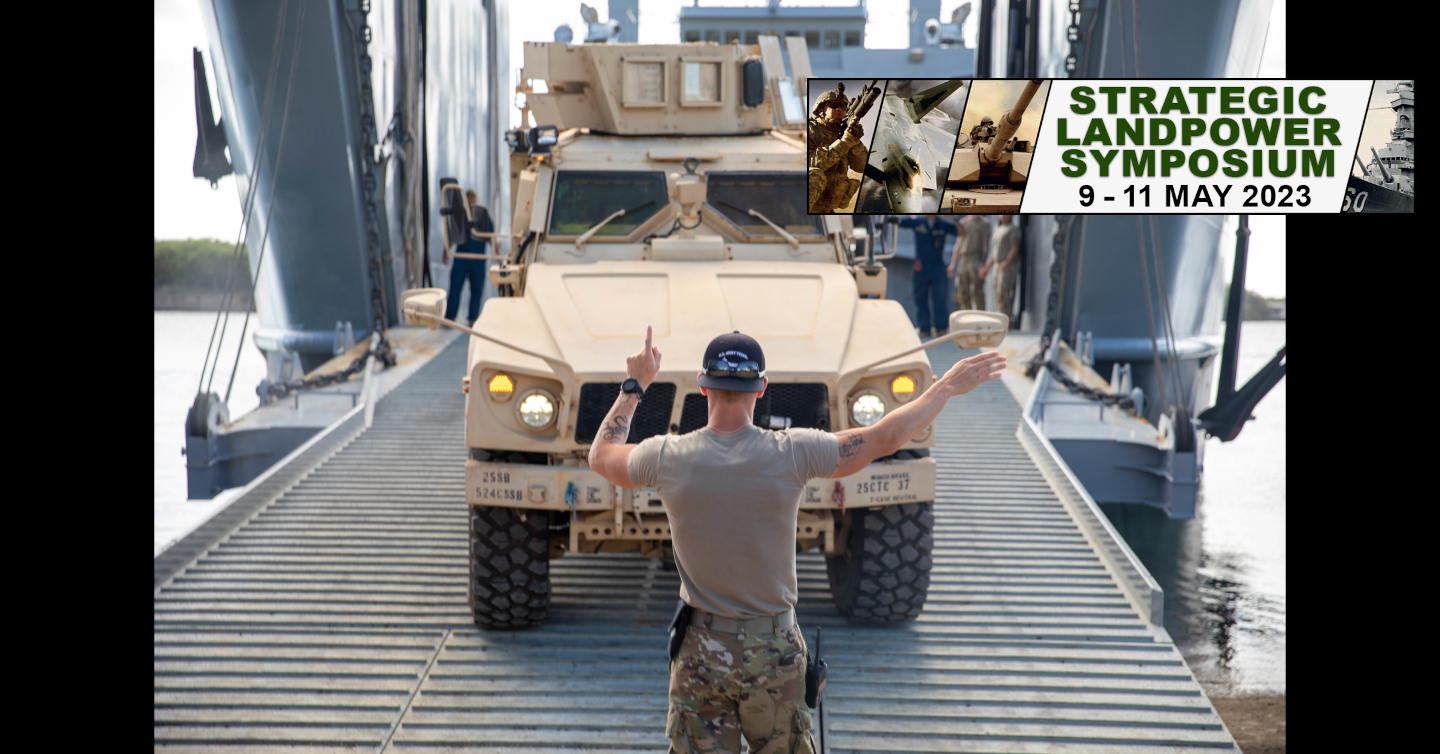
From 10-12 May 2022 the War College hosted the first annual Strategic Landpower Symposium. Bringing together students, scholars and practitioners the symposium displayed original research and presented solutions to senior leaders about how landpower can help achieve national objectives in the future. As part of symposium Army leadership asked the United States Army War College Strategic Landpower Integrated Research Project faculty to address the future role of strategic landpower. Taking up that challenge seven members of the USAWC class of 2022 participated in the integrated research project as part of their Masters in Strategic Studies degree research requirement and presented their results at the symposium to amplify their work. A BETTER PEACE has organized two podcast sessions with those students to discuss their projects, their relationship to the strategic landpower symposium and possible implications for the future of U.S. security policy. In the virtual studio for this second episode to discuss shaping the theater are Tim Clark, Curtis Perkins and Tim Sikorski. They join podcast editor Ron Granieri to discuss a variety of aspects pertaining to landpower to include the theater army’s role in the information environment, sustainment modernization in multi-domain operations and logistics challenges in the INDOPACOM theater.
The second annual Strategic Landpower Symposium is set for 9-11 May 2023 and there is a call for papers due by 15 January 2023. Registration can be accomplished online. The theme will be the “Role of Strategic Landpower in Future Joint and Combined Operations.”
Today all of the Department of Defense and the Merchant Marine cannot match the 400 ships of one World War II service squadron nor can our shipbuilding and general manufacturing and keep pace with the known demand.
Podcast: Download
Subscribe: Apple Podcasts | Spotify | Amazon Music | Android | Pandora | iHeartRadio | Blubrry | Podchaser | Podcast Index | TuneIn | Deezer | Youtube Music | RSS | Subscribe to A Better Peace: The War Room Podcast
Tim Clark, P.E., is currently an Active Guard and Reserve Lieutenant Colonel and will be the next Inspector General for the Army Reserve Aviation Command at Ft. Knox, KY. His recent assignments include Command Transportation Officer at Ft. Buchanan Puerto Rico, and Professor of Military Science at Southern Illinois University Edwardsville. After starting his career in the Active Component, he became a drilling reservist while serving 7 years as a civilian supervisor with the Army Corps of Engineers. He deployed to Kuwait and Afghanistan. He is a graduate of the AY22 Resident Course at the U.S. Army War College.
Curtis S. Perkins is is a Colonel in the U.S. Army and previously served as the Quartermaster Branch Proponent Chief. He has served in leadership positions at the tactical, operational, and strategic levels. He has served on numerous deployments to Afghanistan, Iraq, and Kuwait. His next assignment is the 13th Expeditionary Sustainment Command Chief of Staff. He is a graduate of the AY22 Resident Course at the U.S. Army War College.
Tim Sikorski is a Lieutenant Colonel and an Army Information Operations officer with tactical through strategic level experience. He recently served in Germany as a planner and Chief of Operations and Programs in the U.S. Africa Command Information Operations Division, and as the Special Operations Command Europe Chief of Information Operations. LTC Sikorski is currently serving as the V Corps G39 Chief of Information Operations. He is a graduate of the AY22 Resident Course at the U.S. Army War College
Ron Granieri is an Associate Professor of History at the U.S. Army War College and the Editor of A BETTER PEACE.
The views expressed in this presentation are those of the speakers and do not necessarily reflect those of the U.S. Army War College, U.S. Army, or Department of Defense.
Photo Description: Sgt. Seth Rutter, a watercraft operator with the 168th Transportation Detachment, 8th Special Troops Battalion, 8th Theater Sustainment Command, guides an up-armored vehicle from the 25th Division Sustainment Brigade onboard a Logistic Support Vessel in Waipio, Hawaii on February 22, 2021. The vessel will transport Sustainment Brigade and Signal Brigade vehicles to the island of Hawai’i for an upcoming training exercise.
Photo Credit: U.S. Army Photo by Spc. Michael Bradle





From TRADOC Pamphlet 525-3-1 “The U.S. Army in Multidomain Operations 2028;” therein, see Page vii:
“3. Conducting Multi-Domain Operations:
a. Central idea. Army forces, as an element of the Joint Force, conduct Multi-Domain Operations to prevail in competition; when necessary, Army forces penetrate and dis-integrate enemy anti-access and area denial systems and exploit the resultant freedom of maneuver to achieve strategic objectives (win) and for a return to competition on favorable terms.”
Thought:
The “human domain” anti-access/area denial systems — which prevented the Soviets/the communists from having freedom of maneuver to achieve enduring (revolutionary change) strategic success (both in their own home countries and abroad) during the Old Cold War of yesterday — these are the exact same “human domain” anti-access/area denial systems which prevent the U.S./the West from having freedom of maneuver to achieve enduring (revolutionary change) strategic success (both in our own home countries and abroad) in the New/Reverse Cold War of today.
In both such instances (in the Old Cold War of yesterday and in the New/Reverse Cold War of today), these such “human domain” anti-access/area denial systems are those associated with traditional social values, beliefs and institutions — which are — ROUTINELY THROUGHOUT HUMAN HISTORY — employed and exploited by those entities seeking to NOT to be “transformed.” (For example, by the U.S./the West in the Old Cold War of yesterday re: communism; and by such diverse entities as Russia, China, Iran, N. Korea and the Islamists in the New/Reverse Cold War of today re: Western liberalism.)
Here is an example of China (with very little effort it would seem) (a) marshalling these such “human-domain” anti-access/area-denial systems to (b) contain and roll-back the “revolutionary change” threat posed by the U.S./the West today:
“This may, in fact, be the missing explanatory element. Ideologies regularly define themselves against a perceived ‘other,’ and in this case there was quite plausibly a common and powerful ‘other’ (Western ideas re: constitutional democracy, human rights, and free market reforms) that both (Chinese) cultural conservatism and (Chinese) political leftism defined themselves against. This also explains why leftists have, since the 1990s, become considerably more tolerant, even accepting, of cultural conservatism than they were for virtually the entire 20th century. The need to accumulate additional ideological resources to combat a perceived Western liberal ‘other’ is a powerful one, and it seems perfectly possible that this could have overridden whatever historical antagonism, or even substantive disagreement, that existed between the two positions.”
(Items in parenthesis above are mine. See the April 24, 2015 Foreign Policy article entitled “What it Means to Be ‘Liberal’ or ‘Conservative’ in China” by Taisu Zhang.)
Bottom Line Question — Based on the Above:
Returning to my quote from TRADOC Pamphlet 525-3-1 “The U.S. Army in Multidomain Operations 2028” above:
How do “Army forces penetrate and dis-integrate the enemy (“human domain”) anti-access and area denial systems (see “traditional social value, beliefs and institutions” above) and exploit the resultant freedom of maneuver to achieve strategic objectives.” (Items in parenthesis above are mine.)
(Note: Given that “traditional values, beliefs and institutions” — and the need to overcome same in the name of such things as national security, etc. — given that this would seem to be a continuous and indeed never-ending requirement throughout human history — accordingly, are there not, in fact, numerous examples of how to — and how not to — do this?)
This podcast related question:
Given the “human domain” anti-access/area-denial defensive measures — being undertaken by our opponents/our competitors/our enemies today (see my China example above) —
What — related — “setting the stage”/”setting the theater” measures must our theater commanders take; this, to (a) overcome these such obstacles/these such defensive measures and (b) achieve our (revolutionary change) strategic objectives in these countries anyway/in spite of same?